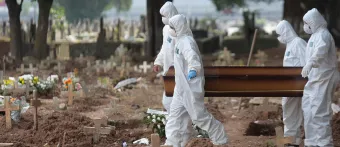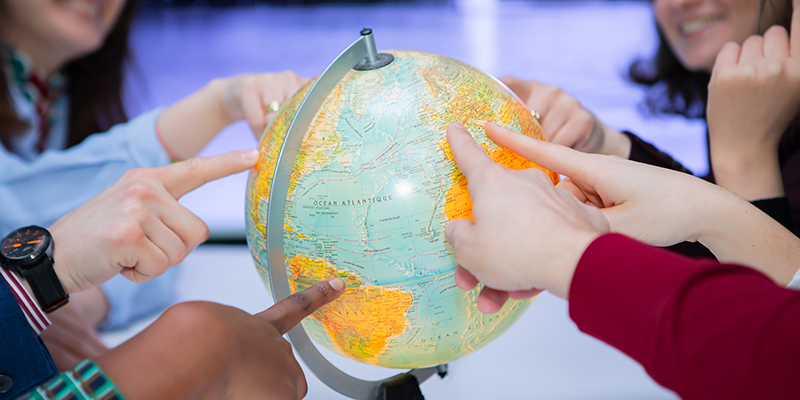The Effect of COVID-19, Geopolitics, and Relationships with China and the United States on Economic Development in Latin America and the Caribbean

The Effect of COVID-19, Geopolitics, and Relationships with China and the United States on Economic Development in Latin America and the Caribbean
The GCSP interviewed Dr Alvaro Mendez, Co-director of the Global South Unit at the London School of Economics (LSE).
He is also Senior Associate Fellow with LSE’s IDEAS; an Adjunct Professor at Fudan Institute for Global Public Policy and an Associate Fellow at the GCSP. Read below to hear his thoughts on COVID-19, geopolitics and economic development in the Latin America and Caribbean.
1. How is COVID-19 affecting Latin America and the Caribbean?
The pain caused by the COVID-19 pandemic in Latin America and the Caribbean (LAC) is unfolding without the intense global attention paid to China, Europe and the United States, but the region has experienced some of the worst outbreaks of the pandemic in the world. The latest estimates by the Pan American Health Organization (PAHE) state that the cumulative number of cases in South America alone stands at 1,150,537, with 50,276 deaths as of 8 June 2020.[1] The actual number is likely to be higher because these estimates rely on officially reported figures, which may be presumed to be inaccurate, given the lack of proper testing and transparency in many of the reporting countries. The World Health Organisation has recently referred to the region as the “new epicentre” of the pandemic. Brazil now has one of the highest death tolls in the world – 36,455 deaths as of 8 June – and experts at the University of Washington’s Institute for Health Metrics and Evaluation are deeply concerned that by early August this number could climb to 125,000 deaths.
2. How has COVID-19 affected the geopolitical landscape in LAC?
It is important to highlight that the pandemic’s impact is not homogeneous and that each of the 33 countries in the region must be scrutinised individually to fully understand how the region is being impacted by the crisis. The geopolitical landscape is shifting in many ways; for brevity’s sake I shall only highlight three main regional impacts. Firstly, the crisis is making economic instability more likely. This is nothing new in LAC, but the recent severe volatility in commodity prices exposes the region massively, because of its overdependence on the extractive economic sector. Secondly, it increases the chances of poor governance and lack of transparency manifesting themselves. Again, this is not a new regional trend, but the crisis has accelerated it across various countries. El Salvador, for instance, has witnessed an exceptional level of abuse of power by the current president, Nayib Bukele, who has exploited the pandemic to usurp extraordinary and unconstitutional powers. Thirdly, the crisis reduces the odds of regional cooperation, due to the already existing inadequate infrastructure for cross-border connectivity. The rates of investment in infrastructure in the region were already extremely low before the crisis (2.3% of GDP per annum on average – a figure so low that only sub-Saharan Africa is comparable). The recommended investment rate before the crisis was 6.2% of GDP, but this is now going to have to be even higher, yet governments are becoming less inclined to invest in cross-border infrastructure projects and are growing increasingly inward-looking.
3. How are LAC’s smaller geopolitical players being affected by major power activities?
LAC’s small states have always been affected by major power activities at various times in the history of the last several centuries. We witnessed some interesting geopolitical manoeuvring in early June 2020 when Iran sent an oil tanker to Venezuela to alleviate massive fuel shortages there, despite Washington’s warning that it would do everything in its power to prevent this from happening. (Both Venezuela and Iran are on the list of nations sanctioned by the United States.) Another smaller LAC country like Cuba has also made its soft-power geopolitical mark on this crisis. Using its long-standing “doctor diplomacy”, Havana was quick to send medical brigades to Italy and South Africa. Washington was nearly as quick to denounce the move by characterising the dispatch of the brigades as exploitative and intended only to “fund the regime’s repression and sow political discord”. The recipients of Cuba’s help did not see it that way and have highlighted the importance of these brigades for combating COVID-19.
4. What early pandemic assessment techniques did/could governments put in place in the region?
The national responses to the COVID-19 crisis are as varied as one would expect from 33 fractious countries. Ways of responding to the pandemic range from very organised in the case of Uruguay, for example, to chaotic in the cases of Brazil and Mexico. Uruguay adopted voluntary quarantine, tracking measures and widespread monitoring from the very beginning of the crisis in March 2020. As of 8 June the country has only had 23 deaths, versus 36,455 in Brazil, where the country’s president, Jair Bolsonaro, refused to take any action, encouraged people to attend mass gatherings and has been happy to exhort people to go to work. In Mexico the response has also been chaotic, with a president who has been too timid to take any decisive action, despite giving daily briefings that critics have called “a spectacle without any value”. The death rate in Mexico has not been as devastating as the one in Brazil (13,699 as of 8 June), but there is increasing fear that the crisis could escalate due to the lack of preparedness of the country’s health sector.
5. How has LAC’s relationship with China and the United States evolved over the last few months? Have trade issues taken a back seat during the current pandemic?
Washington’s influence on LAC has been in decline for some time, preceding both coronavirus and Donald Trump’s presidency. This development coincides with China’s rising influence in the region. The United States had created an “empire by default” in LAC because of its own past spectacular growth and for lack of any conceivable rival. But it has grossly neglected this “backyard” empire by taking it for granted and giving it little heed (let alone strategic thought, except in the purely military sense) proportionate to its importance. The net result is a relationship that the peoples of LAC have felt to be abusive. China needed to improve only marginally on this record to win hearts and minds everywhere, and this it has done, at least in promise. The LAC countries appreciate being recognised, if only discursively, and even if the reality of the new development assistance falls rather too often short of its promise. The pandemic crisis provides a new opportunity for China to position itself to its own advantage by deploying its convincing soft-power diplomacy to produce not only sympathy, but more business opportunities in LAC.
[1] The PAHE recalculates these figures daily.

